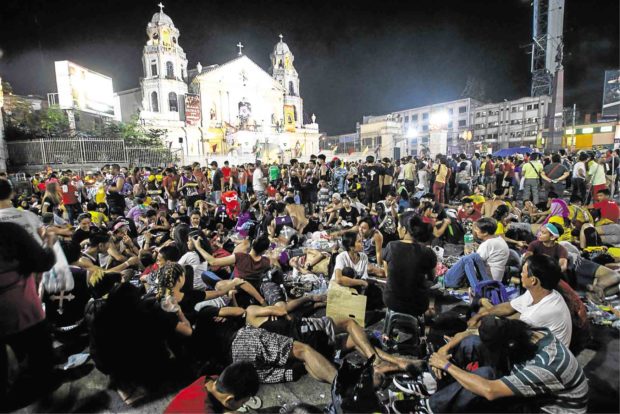
Devotees patiently wait outside Quiapo church in the wee hours of Wednesday for the arrival of the Black Nazarene. —Earvin Perias
After initial reports commending its improved speed and crowd-control measures, this year’s mammoth procession of the Black Nazarene of Quiapo still took about 22 hours to finish — similar to last year’s record — and ended with one devotee dying of a heart attack.
Officials said Ramil de la Cruz, 51, complained of chest pains and stomach ache after jostling through the crowd and reaching for the rope of the carriage bearing the Black Nazarene image as it approached the corner of Hidalgo and Carcer Streets in Manila around 11 p.m. Tuesday.
De la Cruz appeared intoxicated when he and a male companion approached the medical station set up in front of Quiapo Church, according to Johnny Yu, officer in charge of the Manila Disaster Risk Reduction Management Office.
He admitted failing to take his medicine for hypertension for two consecutive days prior to joining the procession, Yu added.
De la Cruz’s blood pressure had shot up to 170/120 but he repeatedly refused to be brought to the hospital, the official said.
Thirty minutes later, while still at the station, he had a cardiac arrest that prompted Yu’s team to rush him to Jose Reyes Memorial Medical Center.
“They (my team) were able to revive him. It was in the hospital where he suffered his second cardiac arrest,” Yu said.
De la Cruz, a former officer of the Bureau of Jail Management and Penology and a Black Nazarene devotee for decades, was pronounced dead around 1 a.m., according to the Manila Police District (MPD).
More than 800 people were hurt in this year’s procession, including one who sustained a suspected neck and spine injury in a fall, according to the Philippine Red Cross.
In the 2016 procession, two devotees died—one having seizures and the other suffering a heart attack.
Based on police estimates, the Jan. 9 feast also known as the “Traslacion” drew around 4.5 million people this year. MPD’s projections went as high 19 million if the turnout in the run-up events — like the “pahalik” vigil and the parade of Black Nazarene replicas — were to be counted as well.
The procession started at 5:07 a.m. on Tuesday at Quirino Grandstand and ended with the return of the Black Nazarene at Quiapo Church at 3:01 a.m. the next morning.
Supt. Erwin Margarejo, MPD spokersperson, said the procession was generally peaceful but noted that, after moving relatively fast on Manila’s main thoroughfares during the day, it slowed down upon entering the narrow inner streets of Quiapo.
The crowd also got bigger at night, Margarejo added. On Arlegui Street alone, the carriage or “andas” got stuck for three hours starting 6 p.m., and moved at a snail’s pace on Globo de Oro, Nepomuceno and Fraternal.